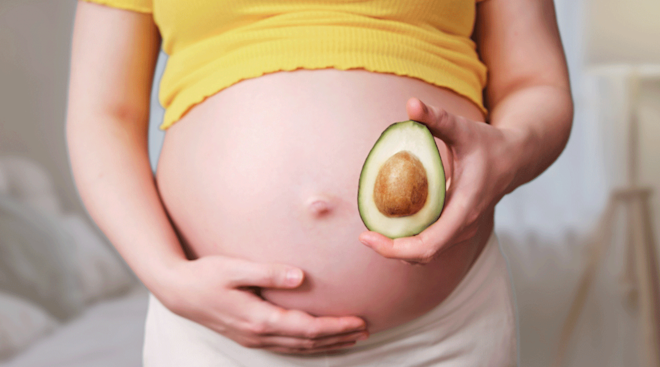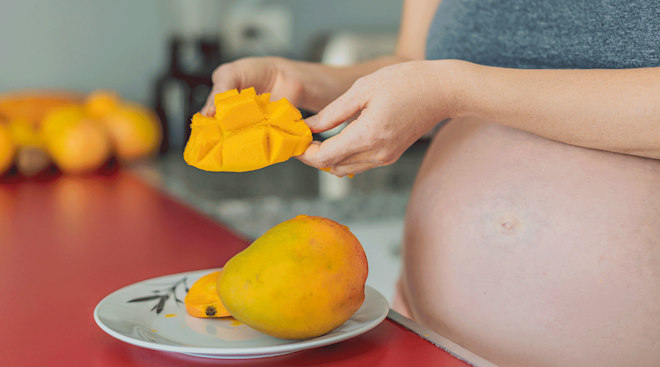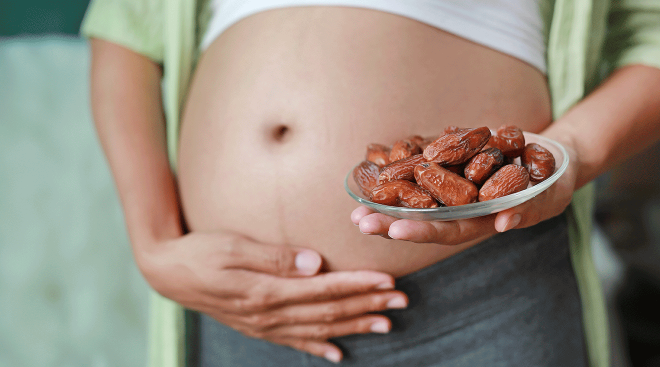Can You Eat Seafood While Pregnant? (and Which Fish Types to Avoid)
If seafood seems a little, well, fishy to eat while pregnant, you’re not the only one hesitating. With a list of foods to avoid that’s seemingly a mile long, it’s hard to remember what you can actually chow down on. Moreover, issues like mercury levels in seafood can give you pause during pregnancy. I personally craved buckets of buttered crab during both of my pregnancies—fortunately, crab is one of the better seafood choices for pregnancy. So my cravings were fully satisfied (hurray!).
Here’s the great news if you also like to visit the crab shack: You don’t need to completely swear off seafood while pregnant. But there’s a catch (get it?). You need to know which fish to avoid during pregnancy, the rules for preparation and how much you’re allowed. Read on to learn what seafood you can while pregnant, plus the types to avoid.
- You can enjoy fish and other seafood while pregnant as long as you follow certain guidelines. Those include choosing options that are lower in mercury to help protect you and baby.
- Make sure to thoroughly cook seafood to an internal temperature of at least 145 degrees Fahrenheit to help eliminate harmful bacteria. Fish should also be opaque and flaky before eating.
- Limit your seafood intake to two to three servings a week, or about 8 to 12 ounces weekly.
Good news for pescatarians and seafood lovers, in general: Yes, you can eat seafood while pregnant. But—and this is crucial—you should only eat fish and other seafood that’s fully cooked and low in mercury. (We’ll dive more into the nitty gritty later!)
“I often encourage seafood consumption during pregnancy. Seafood can be a great source of protein, DHA omega-3 fatty acids, iodine and zinc, which are all important nutrients for your growing baby,” says Theresa Moutafis, RD, IBCLC, a registered dietitian and lactation consultant with Aeroflow Breastpumps.
Pregnancy-safe fish types are typically ones that have lower mercury levels. Below is a list of the safest fish to eat during pregnancy, according to the U.S. Food and Drug Administration (FDA).
- Anchovy
- Atlantic croaker
- Atlantic mackerel
- Black sea bass
- Butterfish
- Catfish
- Clam
- Cod
- Crab
- Crawfish
- Flounder
- Haddock
- Hake
- Herring
- Lobster (American and spiny)
- Mullet
- Oyster
- Pacific chub (mackerel)
- Perch (freshwater and ocean)
- Pickerel
- Plaice
- Pollock
- Salmon
- Sardine
- Scallop
- Shad
- Shrimp
- Skate
- Smelt
- Sole
- Squid
- Tilapia
- Trout (freshwater)
- Tuna (canned light, includes skipjack)
- Whitefish
- Whiting
Keep in mind that just because these fish are deemed safe doesn’t mean you should treat yourself to an unlimited buffet. Lori Antinozzi, MSN, CNM, a certified nurse midwife at Susquehanna OB/GYN & Nurse Midwifery of Advantia in Maryland, says that you should still limit these low-mercury seafood options to about 8 to 12 ounces—or two to three servings—per week. (For reference, 3 ounces of fish is about the size of the palm of your hand.) This way, you can get the benefits of seafood while avoiding the risk of mercury overload to you and baby.
There are also a few medium-mercury level options that are considered “good choices” by the FDA, including Chilean sea bass, grouper, halibut, mahi mahi, rockfish and albacore tuna. (See our graphic for more information!)
Weirdly enough, I had two main cravings when I was pregnant: lobster and tequila. I held off on the tequila, but definitely enjoyed the lobster!
During pregnancy, you’ll need to steer clear of fish with high amounts of mercury since it’s a known neurotoxin. As a general rule, the larger the fish, the higher its mercury. “The high mercury from those fish can pass easily to baby through the placenta, and can cause low birthweight, reduced IQ and neurodevelopmental deficits in children,” says Melinda Feely, MD, a family physician with a specialty in obstetrics at OSF HealthCare in Galesburg, Illinois.
Here’s what fish to avoid during pregnancy, according to the FDA:
- King mackerel
- Marlin
- Orange roughy
- Shark
- Swordfish
- Tilefish (Gulf of Mexico)
- Tuna (bigeye)
Just like any meat, fish needs to be prepared carefully, especially when you’re pregnant. You’ll want to avoid any kind of seafood that’s raw or undercooked. (Sorry, sushi lovers, it’s best to put the chopsticks down for now.) Moutafis explains that during pregnancy, your immune system goes through significant changes to protect baby and yourself, putting you at higher risk of developing illness from bacteria or other germs.
Here are some food safety guidelines for when you’re preparing fish while pregnant, from Moutafis:
- Wash your hands and the cooking surface before preparing any seafood
- Use a cutting board dedicated explicitly to seafood prep
- Cook raw or refrigerated seafood until the internal temperature reaches 145 degrees Fahrenheit, which helps wipe out any harmful bacteria that can make you and baby sick
- Use or freeze fresh seafood within one to two days after preparing
Antinozzi notes that fully cooked fish should be opaque, not transparent or see-through. And when in doubt, stick a fork in your cooked fish and make sure it flakes easily before eating.
“In addition to being a good source of protein, seafood is packed with so many incredible nutrients for you and baby,” says Moutafis. The omega-3 fatty acids in seafood, like the powerful docosahexaenoic acid (DHA), can majorly help with baby’s brain development, according to Mayo Clinic. Studies show that higher levels of DHA in Mom’s blood positively correlate with baby’s brain growth, development and visual keenness.
On top of that, fish is a fantastic source of iron and zinc. “Zinc helps baby build up their DNA—iron is necessary for baby’s brain development and to support your incredible increase in blood volume during pregnancy,” notes Moutafis.
Frequently Asked Questions
Can pregnant women eat salmon? How much?
Cooked salmon is considered one of the best choices of fish to eat when pregnant. The FDA recommends only eating two to three servings (or 8 to 12 ounces) of salmon per week during pregnancy to help avoid the risks of mercury exposure.
Can you eat cooked shrimp while pregnant? How much?
Fully cooked shrimp is considered safe to eat during pregnancy. Just be sure your shrimp is heated to an internal temperature of at least 145 degrees Fahrenheit and is not see-through in color. As with salmon, the FDA recommends limiting shrimp to 8 to 12 ounces per week while pregnant.
Can you eat cod while pregnant? How much?
Yes—you can eat cod while pregnant. As long as it’s fully cooked and flaky, you can safely eat two to three servings of cod a week during pregnancy.
Can pregnant women eat catfish?
Catfish is considered one of the safer fish to eat during pregnancy. It’s a lower-mercury fish pregnant women can have in moderation—about 8 to 12 ounces a week. Just be sure the catfish is fully cooked to an internal temperature of at least 145 degrees Fahrenheit and is opaque in color before eating.
Can you eat canned tuna fish while pregnant?
Canned light tuna is one of the best fish options for pregnancy, notes the FDA. Not only is it safer, but it’s also easier to prepare since it comes pre-cooked. Keep in mind that you should eat canned light tuna in moderation—only about two to three servings per week is recommended.
Can you eat crab while pregnant?
Yes, you can enjoy crab while pregnant. Just be sure the crab is fully cooked and the meat isn’t transparent. Experts also advise only eating about 8 to 12 ounces of crab per week to help avoid mercury buildup.
Can you eat imitation crab while pregnant?
You bet—imitation crab is considered safe to eat during pregnancy. In fact, this crab lookalike is commonly made from a whitefish, like pollock, which is low in mercury, says Feely. However, it’s a good idea to also consider more nutritious choices for your seafood meal since imitation crab is a processed product, adds Moutafis.
Whether you’re craving a nice salmon or a bucket of buttered crab, you don’t have to completely cut out seafood while you’re pregnant. Just remember to stick to fish with lower mercury levels, cook your fish thoroughly and keep it to two to three servings per week. As long as you follow those guidelines, the world’s your oyster! (Oysters, by the way, are a great choice when you’re pregnant too!)
Please note: The Bump and the materials and information it contains are not intended to, and do not constitute, medical or other health advice or diagnosis and should not be used as such. You should always consult with a qualified physician or health professional about your specific circumstances.
Plus, more from The Bump:
Lori Antinozzi, MSN, CNM, is a certified nurse midwife at Susquehanna OB/GYN & Nurse Midwifery of Advantia in Maryland. She earned her nursing degree from Frontier Nursing University in Kentucky.
Melinda Feely, MD, is a family physician with a specialty in obstetrics at OSF HealthCare in Galesburg, Illinois. She received her medical degree from the University of Arizona College of Medicine.
Theresa Moutafis, MA, RD, IBCLC, PMH-C, is a registered dietitian and lactation consultant with Aeroflow Breastpumps. She’s based in Massachusetts.
Mayo Clinic, Pregnancy and Fish: What’s Safe to Eat?, August 2023
Nutrients, Maternal Docosahexaenoic Acid Status during Pregnancy and Its Impact on Infant Neurodevelopment, November 2020
US Environmental Protection Agency, Health Effects of Exposures to Mercury, December 2024
US Food and Drug Administration, Advice About Eating Fish, October 2021
Learn how we ensure the accuracy of our content through our editorial and medical review process.
Navigate forward to interact with the calendar and select a date. Press the question mark key to get the keyboard shortcuts for changing dates.






















































